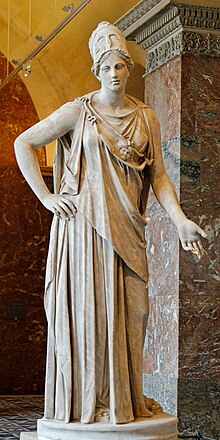Athena Polias
| Athena | |
|---|---|
| Goddess of wisdom, craft, war, diplomacy, weaving, poetry, medicine, and commerce | |

Mattei Athena at Louvre. Roman copy from the 1st century BC/AD after a Greek original of the 4th century BC, attributed to Cephisodotos or Euphranor.
|
|
| Abode | Mount Olympus |
| Symbol | Owls, olive trees, snakes, Aegis, armour, helmets, spears, Gorgoneion |
| Parents | Metis and Zeus |
| Siblings | Aeacus, Angelos, Aphrodite, Apollo, Ares, Artemis, Dionysus, Eileithyia, Enyo, Eris, Ersa, Hebe, Helen of Troy, Hephaestus, Heracles, Hermes, Minos, Pandia, Persephone, Perseus, Rhadamanthus, the Graces, the Horae, the Litae, the Muses, the Moirai |
| Roman equivalent | Minerva |
Athena (/əˈθiːnə/; Attic Greek: Ἀθηνᾶ, Athēnā, or Ἀθηναία, Athēnaia; Epic: Ἀθηναίη, Athēnaiē; Doric: Ἀθάνα, Athānā) or Athene (/əˈθiːniː/; Ionic: Ἀθήνη, Athēnē), often given the epithet Pallas (/ˈpæləs/; Παλλὰς), is the goddess of wisdom, craft, and war in ancient Greek religion and mythology. Minerva is the Roman goddess identified with Athena. Athena is known for her calm temperament, as she moves slowly to anger. She is noted to have only fought for just reasons, and would not fight without a purpose.
...
Wikipedia
